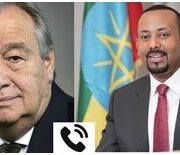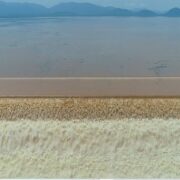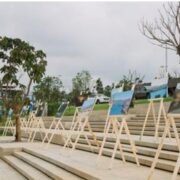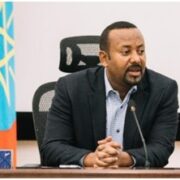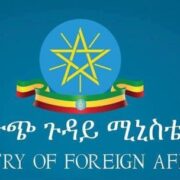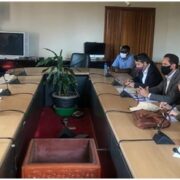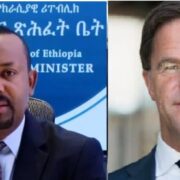Recently we noted a post on GERD by the Embassy of Egypt in Washington D.C that is intended to misinform and mislead the international community. The following brief fact sheet is intended to provide factual information and to put the records straight. Egypt’s protracted campaign of misinformation will not be helpful to the success of the trilateral negotiation and will erode the trust built among the three countries of Egypt, Ethiopia and Sudan.
Background
The Grand Ethiopian Renaissance Dam (GERD) is a hydropower dam that Ethiopia is constructing on the Abbay/Blue Nile River. Ethiopia generates 86% of the Nile flow with a total average annual flow of 77 billion cubic meters. For Ethiopia accessing and utilizing its water resources is not a matter of choice, but an imperative of continued existence. The Nile is a source of livelihood for the Ethiopian population of more than110 million people. The purpose of the GERD is lifting millions of people out of poverty and provide access to electricity to more than 60 million Ethiopians and provide affordable electricity to the service, industrial and agriculture economic sectors. The very site of GERD, formerly known as Border Dam, was studied in the 1960’s by USBR and in the 1990’s by a French consultant BCEOM. With its 5,150 MW installed power generation capacity, GERDP will increase Ethiopian Hydroelectric power generation by 15,692 GWh/year on average. GERDP represents a sustainable socio-economic project for Ethiopia: replacing fossil fuels and reducing CO2 emissions, it will significantly contribute to the economic and social development of Ethiopia.
Benefits of GERD
The GERD will store 74 BMC and this stored water will be a resource that will benefit all the three countries of Egypt, Sudan and Ethiopia during drought periods. The GERD will also offer regulated flow which will help the downstream countries to better manage their respective reservoirs.
The GERD will reduce negative impacts of climate change such as recurrent floods. The GERD will further capture 90 percent of the sediment protecting irrigation canals and equipment from damages caused by sedimentation.
Furthermore, the GERD will improve the efficiency of dams and water use optimization in the downstream. Combined with more regular flows, Sudan hydropower dams energy generation will be uplifted by more than 2,657 GWh/year due to the GERD regulation of flow.
The GERD will regulate the flows of the Blue Nile and this will support flows arriving at the High Aswan Dam (HAD) of Egypt and Risk of HAD overtopping will be eliminated. With GERD operating upstream, average annual HAD evaporation losses will be tremendously reduced. Due to regulated and increased flows a longer period of navigation on the Nile River will be possible.
Despite these glaring facts, Egyptian officials are obsessed with disseminating baseless information that the filling and operation of the dam will have significant economic, environmental and social repercussions.
Fallacy 1: “a decrease of only 1 bcm of water could eliminate more than one million jobs and $1.8 billion in economic production annually in all economic sectors.”
The assertion that one billion cubic meter reduction of flow in the Nile directly translates to loss of agricultural land and economic gains in Egypt is a fundamentally flawed and misleading concept. The High Aswan Dam is a reservoir with a capacity of 162 billion cubic meter water, built to ensure sustainable water provision and overcome water shortage during low flow in the river. HAD is a multiyear reservoir that can accommodate very large annual flow variability of (48.9bcm – 131bcm) at Aswan site. The main function of HAD is to regulate this variability. A decrease of 1 BCM directly translates in to loss of jobs and economic production is unreasonable.
Fallacy 2: ”Ethiopia enjoys multiple renewable water resources, and an abundant 8100 cubic meters per capita (cm/pc) of fresh water annually”.
Ethiopia’s water resource is 123BCM per year and the current per capita water availability is 1069 cubic meters per capita per year. In 60% of the country the per capita water availability is in the order of only 300 cubic meter per capita. It is puzzling why such misleading information is propagated by Egypt.
According to the world-bank and FAO aqua-stat recent global datasets, the total freshwater withdrawal of Egypt is 4100 cubic meter/per capita, which is provided from Ethiopia’s internally generated freshwater sources through the Nile River and storage of HAD. Whereas Ethiopia’s total freshwater withdrawal is only 6.4cubic meter /per capita.
Fallacy 3: ” Egypt is highly efficient in using its water,”
Facts on the ground depict differently. Egypt’s water use is wasteful and uses backward irrigation technology in addition to growing water intensive crops. Agriculture is practiced in desert areas wasting water through evaporation and seepage. A study by Walaa and Ahmed, 2019 from Zagazig University, Egypt concluded that substantial water can be saved(up to 40BCM) if Egypt made improvements to its irrigation practice.
Fallacy 4: “Over ten years of faltering negotiations, Ethiopia refused to allow any impartial parties to attend the talks, even as silent observers”.
Transboundary rivers negotiations take time and Ethiopia believes progress has been achieved during the last decade our trilateral negotiations can not be characterized as faltering. The Declaration of Principles signed by the leaders of the three countries in 2015 is an achievement negotiated by the three countries alone. Ethiopia accepted the participation of the United States and the World Bank as observers and participated in the negotiations. Ethiopia is currently participating in the AU led negotiations. The US led negotiation process, subsequent statements by the relevant parties are on the record and can be referred to verify the facts. The baseless accusation of Egypt stands contrary to the good faith and proactive participation of Ethiopia in the trilateral negotiations.
Fallacy 5: “Ethiopia commenced the construction of the GERD unilaterally in 2011 without informing or consulting with Egypt or Sudan in advance– a breach of its obligations under international laws.”
Recognizing the transboundary nature of the River, Ethiopia has gone beyond its due diligence under international law. Unprecedented in the Nile Basin, where unilateralism is a norm by downstream countries, Ethiopia called for cooperation and from the very beginning Ethiopia has been open, transparent and cooperative. It has initiated the tripartite negotiations and provided GERD design and study documents to Egypt and Sudan. An International Panel of Experts in which Egypt and Sudan participated reviewed all relevant project documents, made field visits to the project site and submitted its final report to the three countries in May 2013. Whereas, the two downstream countries have built numerous hydraulic infrastructure over the past decades without informing the Nile riparian countries, foreclosing their future development by so doing, Egypt’s false and unwarranted accusation is misleading.
Egypt and Sudan want to monopolize the entire Nile water and impose a 1959 colonial era treaty that zeros the water share of upstream countries. Egypt and Sudan insistence on maintaining unjust colonial based treaties is the overarching impediment to the equitable and reasonable utilization of the Nile waters. Such kind of Sudano-Egypt’s treaty defeats all forms of international transboundary water laws and a clear intransigence.
Fallacy 6: “Ethiopia has not provided any socio-economic and environmental impact studies of the dam on downstream countries “
The fallacy of this accusation can simply be verified by referring to the report of the International Panel of Experts (IPoE). Ethiopia has provided environment and social impact studies of the direct impact zone, an initial transboundary environment impact study and a hydrological simulation study that were duly reviewed by the IPoE.
Fallacy 7: “Even though the African Union called for a binding agreement on the GERD filling and operation, Ethiopia announced that it is not seeking a binding agreement,”
It is obvious any document signed by and among sovereign states is binding. The GERD guidelines and rules on the first filling and annual operation are not exception to this. However, the GERD rules will have a character suitable for the nature of dam operation as provided under the DoP. Notwithstanding, Egypt continues to accuse Ethiopia of not willing to conclude a binding deal. The rational of this accusation is the demands of Egypt and Sudan to make Ethiopia conclude an agreement that forecloses water development upstream of the GERD.
Ethiopia proposed a workable option to address the stalemate. A proposal to agree on the first filling and to continue dealing with issues of operation taking the remining five years simultaneous with the filling of the GERD. However, the downstream countries refused to accept this proposal due to their futile attempt to trap Ethiopia to accept the unfair status-quo.
Fallacy 8: Ethiopia Repeatedly Aborts Compromise Agreement
Ethiopia is committed to the trilateral negotiation, which it believes can come to a successful completion given the good faith engagement of the countries. Unfortunately, in the past seven months of negotiation only, the AU led process is interrupted seven times due to a coordinate work of Egypt and Sudan. In 2018, Egypt declined to sign a filling and operation agreement developed by the National Independent Scientific Research Group, composed of 15 scientists from the three countries, and discontinued the negotiation for a period of 11 months. Anybody interested can check the chronology and conduct of all meetings in the last several years and all delays in the progress of the negotiation is attributed to Egypt and Sudan.
Fallacy 9: “Even in the worst prolonged droughts, Ethiopia was guaranteed that it would produce no less than 75-80% of the GERD’s actual hydropower production capacity.”
It is obvious that it is not possible to generate 75-80% of GERD hydropower potential with lower head and low flow conditions. Egypt’s insistence to operate GERD at a low head combined with reduced drought period flow, energy generation brings GERD down to 40%. It is not wise to mislead the international community by fabricating unsubstantiated figures.
Fallacy 10: “……millions of lives will be at “great risk” if Ethiopia unilaterally fills and operates the GERD without reaching an agreement”.
This repeated allegation has never been substantiated on how filing and operating GERD will cause great risk. Ethiopia has never accepted an undertaking to secure the permission or agreement of Egypt and Sudan when filling the GERD. However, Egypt and Sudan continue contesting the filling of the GERD, from the position of self-claimed and unjust privilege, contrary to what is provided in the DOP with regards to filling and operation of GERD.
Egypt and Sudan continue to contest the first-year filling of the GERD, despite the fact that they were provided with relevant information well before the commencement of the filling. The two countries knew the time and volume of the water to be retained. Despite the continued negative campaign of Egypt, the dam construction will continue as planned and its filling and operation will be conducted in compliance with accepted principles of equitable and reasonable utilization and causing no significant harm and as per the principles enshrined in the DoP.
Let not insult the intellect of the world, and be faithful for principles and acceptable norms and standards!
Embassy of Ethiopia
Washington, D.C

